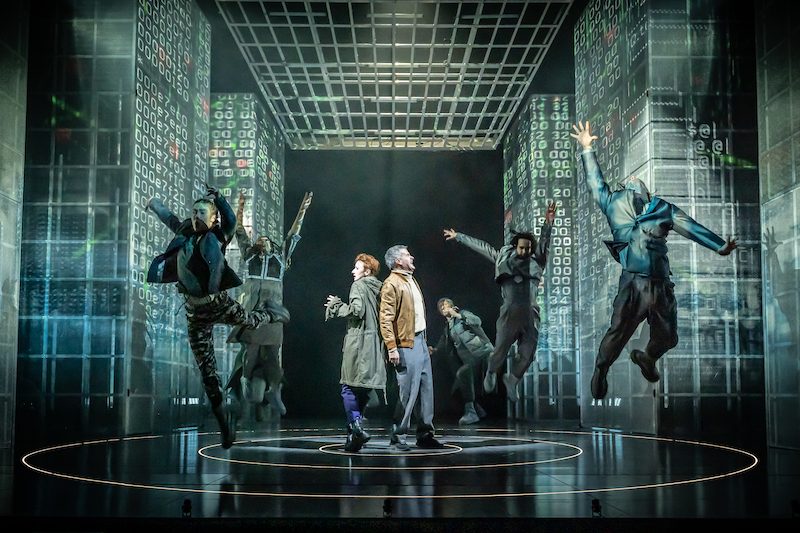Lyric Theatre, Hammersmith – until 18th May 2024
Reviewed by Phil Brown
3***
This 90 minute (no interval) play written by well known actor David Haig is based on a 1956 novella by Philip K Dick. Dick’s novella looks forward 100 years to 2054, whilst Haig’s adaptation uses a similar time horizon of 2050-2055. Meantime, in the real world, there have been phenomenal developments across the board in human knowledge, expertise and experience, particularly in politics, technology, life sciences and neuroscience. As a result, the basic story of Minority Report is nowhere near as fantastical as it would have been on initial publication, and the prescient power of the message is somewhat diluted and certainly less shocking as a consequence.
At its heart, the story is about the surveillance society, continually scanned for “pre-crime” – criminal thought just on the verge of crystallisation, but not consciously formed. It paints a bleak, dystopian picture, one that is all too credible in this post-truth day and age, where hate crime has just appeared on the statute books north of the border, and where the wrong opinion can get you summarily cancelled.
It raises interesting questions about liberty and trust. As we know from recent experience, expert predictions can be hopelessly wrong. Can we ever trust a “black box” system to be right in every case (no) and do we accept restrictions on privacy and liberty if the greater good is deemed to be served. Thankfully the apparently small step from hate crime to thought crime would actually require incredible technological advance as well as the “co-operation” of the public to get chipped. Interestingly, Haig’s well constructed play makes reference to the 2038 Implant Referendum…
Haig makes a few changes to Dick’s basic story. The protagonist, neuroscientist Julia Anderton, powerfully and convincingly played by Jodie McNee, is a women, rather than a man, and is driven in her role as the head of British Pre-crime, by the murder of her twin sister Laura. Her husband Sir George Anderton (a very credible boffin played by Nick Fletcher) is the technical whizz behind the pre-crime technology. Rather than Dick’s 3 mutants with precognitive abilities, we have 3 precogniscant interpreters (precogs) – expert neuroscientists based in a secret location, who somehow analyse millions of thought waves to identify pre-murderers. Pre-criminals are then disabled by intense sound and arrested by the red circle – a nano film membrane that in one memorable line leaves the culprit “ vacuum packed like meat in a supermarket”. Within 20 minutes, they are installed in a Humane Detention Centre (HDC).
The play opens with a self congratulatory celebration of the 10th Anniversary of British Pre-Crime in 2050. Julia’s Thatcherite zeal seem perfectly pitched in selling its success. Inevitably it is interrupted by the libertarian group Cognito, specifically Fleming (played by Danny Collins), which is quickly snuffed out, followed by a demo of a different kind – the pre-crime system at work. This is where Julia’s certainty gets well and truly demolished as it becomes apparent she has been identified as a pre-murderer. The ensuing action sees Julia wholly unprepared to accept the conclusion of the pre-crime system she has imposed on the population as a whole, and sets about about evading arrest and trying to prove her innocence with the help of AI Assistant David (nicely played by Tanvi Virmani) and more surprisingly, libertarian group Cognito’s Fleming.
Aside from an excellent twist at the end, as a plot it’s pretty humdrum, even tame. The script veers between compelling and mundane, with a few weak attempts at humour eg threatening the AI assistant with a “downgrade to Alexa or even worse Siri”. There is some mambo jumbo around the precogs and scope for pruning. In the circumstances, the cast does a great job with the material. The production (Jon Bausor) is high quality and adds much needed gloss to bolster the show, but owes something to Bladerunner. Direction (Max Webster) is reasonably pacy and there is good use of lighting (Jessica Hung Han Run), effects (Tal Rosner – Video Designer/Richard Dinner – Illusions Designer) and sound (Nicola Chang).
This well honed performance works on a couple of levels – as simple light entertainment and as a thought provoking question – how might technology be exploited for political purposes. What really resonates for me though, was that Julia Anderton’s motivation derives from a direct personal experience. A sample of one. Haig might have put his finger on a disturbing trend in current politics.

